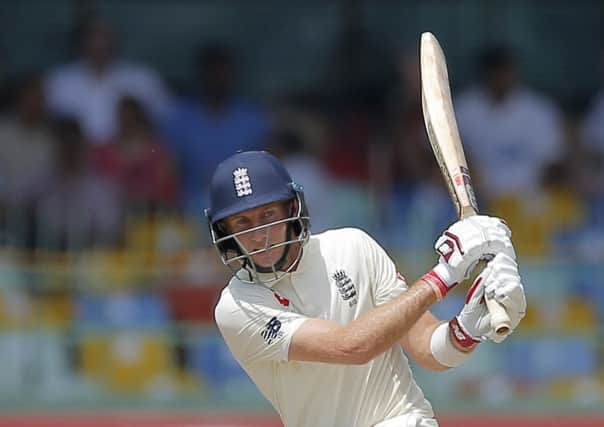Chris Waters: England’s elan looks set to help them alter history


England’s pre-Christmas stroll on the subcontinent was their first Test series triumph away from home for almost three years, so no one should ignore the historical context – multiplied, in this case, by the fact that England have won only one Test series in the Caribbean in 51 years (Michael Vaughan’s class of 2004).
At the same time, the West Indies are even worse than Sri Lanka (ranked eighth in the world to Sri Lanka’s sixth), and, let’s face it, Sri Lanka are not particularly good.
Advertisement
Hide AdAdvertisement
Hide AdWhy, no sooner had they been shown up by Joe Root’s men than they were beaten in New Zealand, who thumped them by 423 runs in a second and final Test so one-sided that it was the equivalent of watching a pit-bull terrier having a set-to with a cuddly toy.
To borrow the old cliche, however, a side can only beat the opposition in front of it, and England showed all their burgeoning skill under Root’s maturing captaincy to beat Sri Lanka comfortably, exhibiting the type of attacking elan that is making the Yorkshireman’s team such a good one to watch, albeit one still learning to balance attack and defence.
As Sir Alastair Cook, Root’s predecessor as captain, wrote in his newspaper column on Sunday: “I look at England now and it feels like Joe’s team. He has old heads like Jimmy Anderson and Stuart Broad to turn to, but also a core of contemporaries – Buttler, Bairstow, Stokes, Moeen Ali – and some promising young players in Sam Curran and Ben Foakes.
“When a captain and his troops are in alignment like that the team unit often adds up to more than the sum of its parts.”
Advertisement
Hide AdAdvertisement
Hide AdSuch is the extent of England’s parts that there are now plenty of tough selection decisions for Root et al, just as there are for one-day captain Eoin Morgan and co.
Perhaps the most obvious resulted in the controversial move to take the wicketkeeping gloves off Jonny Bairstow in Sri Lanka and confer them, for the time being at least, on Ben Foakes, who had seized his chance with a debut hundred after Bairstow injured an ankle playing football.
Bairstow responded as only he can, by scoring a century at the first time of asking in his new position at No 3, the only route back into the team as Root does not want to bat there himself, while England’s spin bowling options are such that they can call on Moeen Ali, Jack Leach and Adil Rashid, all of whom can do a fine job.
If anything, however, Foakes’s emergence, impressive as it was, has disrupted the balance of the England side.
Advertisement
Hide AdAdvertisement
Hide AdAs the Surrey man is effectively playing as a wicketkeeper first and foremost, albeit one expected to perform strongly with the bat, it means that England cannot field four seamers and two spinners as they did against India last summer, for example.
This might not be a problem against the West Indies (although it is far from ideal), but it might against better quality sides when greater bowling options are both sensible and desirable.
For that reason, Foakes’s batting form in the West Indies will be of particular interest (can he maintain it?), as will that of Rory Burns and Keaton Jennings, who are desperate to cement their opening partnership/places ahead of this summer’s Ashes.
Whether good performances against the West Indies will provide definitive answers to the various questions that England face is a moot point for the hosts are in seemingly perennial decline, beset by internal squabbling and politics that would not have disgraced Yorkshire in the Seventies and Eighties.
Advertisement
Hide AdAdvertisement
Hide AdThey have little financial clout behind them compared with England – the nets at the Three Ws Oval for last week’s practice match, for example, were considered too dangerous and the pitch not good enough for first-class cricket – and they have not won a Test series against a leading Test nation since 2012.
Granted they pulled off a remarkable win at Headingley in 2017, chasing down 322 to win a Test match in England for the first time in 17 years en route to a 2-1 series defeat.
But with England having won eight of their past nine Tests, and with this Test series featuring the Dukes ball that is so lethal in the hands of James Anderson, Root’s men should be strong enough to make light work of Caribbean-Anglo cricketing history and their second relatively modest – one had perhaps best not say “mediocre” – opponents of the winter.